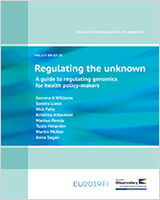NCBI Bookshelf. A service of the National Library of Medicine, National Institutes of Health.
Key messages
- Genomics can improve individual and population health outcomes, but making genomic data widely available creates ethical, legal and social challenges.
- Genomics reveals sensitive personal and familial information. This may improve prevention and treatment but means that, without regulation and other measures, at risk individuals can be discriminated against; or that those at low risk may opt out of public protection. This endangers the equity and solidarity that underpin European health systems.
- The possibility of data being misused by insurers, employers or others makes it essential that there is strong regulation of genomic data in research, in health care and more widely. Regulation needs to be proportionate to balance privacy and data security against the benefits of scientific advances and their translation into clinical practice.
- The 2018 European Union General Data Protection Regulation (GDPR) has transformed the way genomic data are processed and will impact research, clinical practice and national regulators, even beyond the EU.
- The benefits of genomics can only be realized if, in addition to effective regulation:
- –There is broad societal trust built by active dialogue and engagement.
- –All stakeholders, including industry are involved so that genomic initiatives engender confidence and align with societal values.
- –Wider information infrastructure and digitalization strategies are in place so that genomic data can be linked to other information without breaching public trust.
- –Policy makers are able to manage the costs of genomics-driven innovation and ensure that benefits give value for money, improve health and are fairly distributed.
Contents
- Acknowledgments
- Foreword
- Acronyms
- Executive summary
- POLICY BRIEF
- 1. Introduction: Why this brief?
- 2. What are the key ethical, legal and social challenges related to the growing availability and application of human genomic information?
- 3. What are the key regulatory challenges related to the processing of genomic data and how have these been addressed?
- 4. The way forward? Discussion and conclusions
- ANNEXES
- References
- Joint Policy Briefs
About the Series
Address requests about publications of the WHO Regional Office for Europe to:
Publications
WHO Regional Office for Europe
UN City, Marmorvej 51
DK-2100 Copenhagen Ø, Denmark
Alternatively, complete an online request form for documentation, health information, or for permission to quote or translate, on the Regional Office web site (http://www.euro.who.int/pubrequest).
All rights reserved. The Regional Office for Europe of the World Health Organization welcomes requests for permission to reproduce or translate its publications, in part or in full.
The designations employed and the presentation of the material in this publication do not imply the expression of any opinion whatsoever on the part of the World Health Organization concerning the legal status of any country, territory, city or area or of its authorities, or concerning the delimitation of its frontiers or boundaries. Dotted lines on maps represent approximate border lines for which there may not yet be full agreement.
The mention of specific companies or of certain manufacturers’ products does not imply that they are endorsed or recommended by the World Health Organization in preference to others of a similar nature that are not mentioned. Errors and omissions excepted, the names of proprietary products are distinguished by initial capital letters.
All reasonable precautions have been taken by the World Health Organization to verify the information contained in this publication. However, the published material is being distributed without warranty of any kind, either express or implied. The responsibility for the interpretation and use of the material lies with the reader. In no event shall the World Health Organization be liable for damages arising from its use. The views expressed by authors, editors, or expert groups do not necessarily represent the decisions or the stated policy of the World Health Organization.
This policy brief is one of a new series to meet the needs of policy-makers and health system managers. The aim is to develop key messages to support evidence-informed policy-making and the editors will continue to strengthen the series by working with authors to improve the consideration given to policy options and implementation.
Box
What is a Policy Brief?
- NLM CatalogRelated NLM Catalog Entries
- Impact of the European General Data Protection Regulation (GDPR) on Health Data Management in a European Union Candidate Country: A Case Study of Serbia.[JMIR Med Inform. 2020]Impact of the European General Data Protection Regulation (GDPR) on Health Data Management in a European Union Candidate Country: A Case Study of Serbia.Marovic B, Curcin V. JMIR Med Inform. 2020 Apr 17; 8(4):e14604. Epub 2020 Apr 17.
- Review Tuberculosis.[Major Infectious Diseases. 2017]Review Tuberculosis.Bloom BR, Atun R, Cohen T, Dye C, Fraser H, Gomez GB, Knight G, Murray M, Nardell E, Rubin E, et al. Major Infectious Diseases. 2017 Nov 3
- Review The significance of general data protection regulation in the compliant data contribution to the European Society of Thoracic Surgeons database.[Eur J Cardiothorac Surg. 2023]Review The significance of general data protection regulation in the compliant data contribution to the European Society of Thoracic Surgeons database.Bertolaccini L, Falcoz PE, Brunelli A, Batirel H, Furak J, Passani S, Szanto Z. Eur J Cardiothorac Surg. 2023 Sep 7; 64(3).
- Citizens' conceptions of the genome: Related values and practical implications in a citizen forum on the use of genomic information.[Health Expect. 2021]Citizens' conceptions of the genome: Related values and practical implications in a citizen forum on the use of genomic information.Mayeur C, van Hoof W. Health Expect. 2021 Apr; 24(2):468-477. Epub 2021 Jan 16.
- Towards a European health research and innovation cloud (HRIC).[Genome Med. 2020]Towards a European health research and innovation cloud (HRIC).Aarestrup FM, Albeyatti A, Armitage WJ, Auffray C, Augello L, Balling R, Benhabiles N, Bertolini G, Bjaalie JG, Black M, et al. Genome Med. 2020 Feb 19; 12(1):18. Epub 2020 Feb 19.
- Regulating the unknownRegulating the unknown
Your browsing activity is empty.
Activity recording is turned off.
See more...
